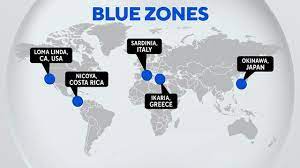 Blue zones refers to regions in the world where people are claimed to live longer than average: Okinawa Prefecture, Japan, Nuoro Province, Sardinia, Italy, the Nicoya Peninsula, Costa Rica, and Icaria, Greece.
Blue zones refers to regions in the world where people are claimed to live longer than average: Okinawa Prefecture, Japan, Nuoro Province, Sardinia, Italy, the Nicoya Peninsula, Costa Rica, and Icaria, Greece.
Scientists used a blue pen on a map to mark the villages with long-lived population.
The concept of blue zones having exceptional longevity has been challenged by the absence of scientific proof, and by the substantial decline of life expectancy during the 21st century in an original proposed blue zone, Okinawa.
Initial analysis was that the apparent longevity of blue zone populations resulted from practice of a traditional lifestyle, including regular physical activity beyond age 80, providing family and community support for elders, and consuming locally produced food.
Common contributing factors include a plant-based diet rich in whole foods, regular physical activity, low stress levels, strong social connections, and a sense of purpose.
Additionally, the environment and culture of these regions often promote healthy habits and behaviors.
Thyese factors may play a significant role, genetics and other unique aspects of each community also contribute to the longevity observed in blue zones.
Life expectancy in blue zones is proposed to be as much as a decade or more longer compared to the average world life expectancy of 73 years in 2019.
Marketing
Loma Linda, California, United States, was included as a blue zone by Dan Buettner, founder of the marketing company, Blue Zones LLC, and popular press, which described the Seventh-Day Adventist community there as having unusual longevity due putatively to a healthy lifestyle and plant-based diet.[5][6] In 2020, Blue Zones LLC was acquired by the Seventh-Day Adventist health care system, Adventist Health.[7]
A study of claimed longevity in Okinawa was unable to verify whether or not residents were as old as they claimed because many records did not survive World War II.
When analyzed in the 21st century, life expectancy in Okinawa was deemed to no longer be exceptional when compared to the rest of Japan.
There are no controlled studies of elderly people in the blue zones, and the blue zone diets are based on speculation, not solid science.
